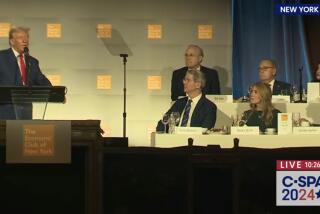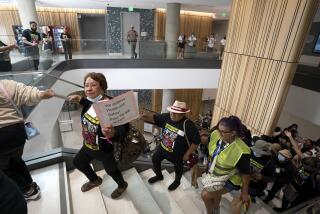Nanny Policy: Equity and Domestic Help : Washington makes a stab at reforming Social Security rules
- Share via
Housekeepers are ubiquitous in Southern California. They clean, cook, care for children and generally work very hard for very little pay. On retirement, like most American workers, they are eligible for a Social Security check and Medicare benefits. Few collect because most employers fail to pay the requisite taxes. To ensure a minimally decent retirement for elderly nannies and other household workers, Congress should make it easier to pay up.
The law requires anyone who hires household help to pay a 7.65% Social Security tax on wages. (The employee is required to pay the same amount, but the IRS says that many bosses pay both shares.) The burdensome system is triggered when wages reach $50 during any three-month period. That antiquated threshold, which was set more than 50 years ago, now is easily reached in a day of cleaning or a weekend of baby-sitting. A much higher threshold is needed. Also, compliance requires completing complicated paperwork every three months and figuring out the amount of quarterly payments. That onerous task requires a calculator and a surfeit of patience. There’s got to be a better way.
Washington is considering several improvements. The Senate Finance Committee, chaired by Daniel P. Moynihan (D-N.Y.), recently approved a bill that would raise the threshold from the measly $50 per quarter to a still-too-low $630 a year. The legislation also would allow employers to satisfy their debt when they file their income taxes. It would exempt teen-agers who baby-sit, mow the lawn or perform other tasks. That’s reasonable.
The House is expected to consider similar legislation soon--but all this comes far too late to save the Clinton Administration from embarrassment.
Zoe Baird, President Clinton’s first choice for attorney general, was the Administration’s first casualty under this law. She never paid taxes on the wages of the Peruvian couple she hired to watch her child and tend her yard. (It didn’t help her case that the housekeeper and gardener were in this country illegally.) Commerce Secretary Ronald H. Brown also ran into trouble for failing to pay taxes on the wages of his part-time housekeeper. Other candidates for Administration jobs at various levels were removed from consideration because of their negligence.
And the list grows longer. The latest to be caught is William Kennedy III, a White House attorney in charge of clearing Administration appointees of these very sins. He quietly paid up last month for a nanny who worked for him in 1991. His offense cost him: Clinton’s clean-up man, Lloyd Cutler, the White House special counsel named in the wake of Whitewater, demoted Kennedy and appropriately stripped him of some duties.
These high-profile cases put everyone on notice. Scofflaws can no longer plead ignorance. Yet their ranks remain plentiful. The Internal Revenue Service estimates that fewer than one out of four people who regularly use a maid or baby-sitter pay taxes. Granting amnesty would encourage more Americans to satisfy this important obligation. Overhauling the law that requires the taxes also would increase compliance.
The women and men who work in the homes of others are not seeking charity. They earn these benefits. They can collect only if the Social Security Administration records taxes on wages for at least 10 quarters. More Americans will be encouraged to do that if Congress sets the triggering threshold high enough--and keeps the paperwork simple.
More to Read
Inside the business of entertainment
The Wide Shot brings you news, analysis and insights on everything from streaming wars to production — and what it all means for the future.
You may occasionally receive promotional content from the Los Angeles Times.










